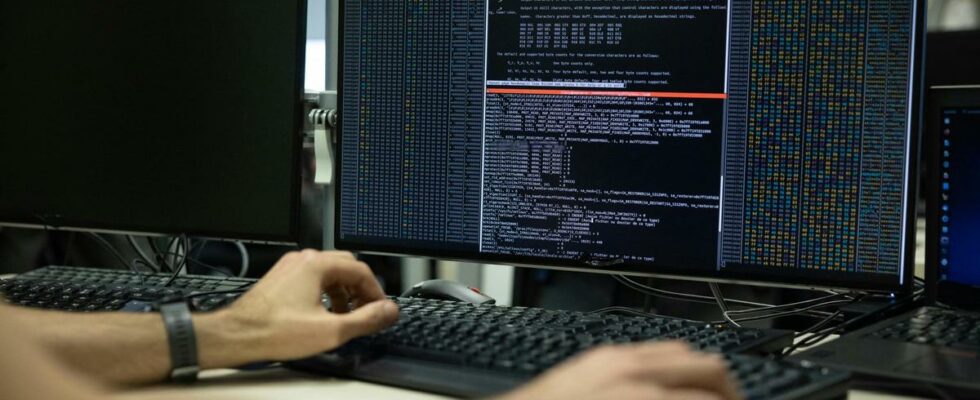Camp beds, combat rations and networked computers: a hundred students from the University of Lorraine are taking part until Friday, February 10 in a large-scale cyber warfare exercise organized with the army, to develop their skills and encourage vocations in cybersecurity.
Well-thought-out scenarios
“Axel, we have a problem, they have access to our site“. In an instant, the tension escalates in the team’s command room.Cryptanga», opposed to «Anumerics“. These two imaginary countries are engaged in a digital battle in order to obtain the license to operate lithium mines located on the island of “Riverchelles“.
The scenario, between two powers fighting over access to rare resources, was not thought out at random. “We tried to stick to reality as much as possible, even if it’s fictional, so that it’s as immersive as possible for the students.“Describes Captain Jean-Philippe *, co-host of the exercise and operational reservist at the Cyber Defense Command (Comcyber), the branch of the army responsible for cybersecurity.
Read alsoA Cyber Campus to boost IT security
The exercise takes place online thanks to two cyber-ranges, imposing servers making it possible to recreate a virtual network similar to the Internet, but without interaction with it. Social networks or online media have also been reproduced, as well as connected physical security systems (video surveillance, access cards) so as to allow this cyberwar to unfold in all its dimensions.
“There are over 200 pieces of equipment in the exercise set“, completes Captain Pierre, cyber defense reservist and master of the game. “We have routers, servers, telecommunications equipment, automatons, robots, a whole range of digital artifacts that we encounter in the cybersecurity professions, and which are to be analyzed, defended or attacked.“.
TO HAVE ALSO – Cyberattack on the Versailles hospital: “The continuity of care is assured”, reassures François Braun
Winning the information war
To win, each team must defend its credibility online by keeping control of its digital infrastructures, while destabilizing those of the adversary.
“There, our opponents managed to enter our media site and post content. We just realized it, we are going to set up a crisis unit to see how we can recover it“, worries Florent Thirion, 25 years old, student in master 2 Strategic monitoring and organization of knowledge at the University of Lorraine. Behind him, other students, trained in Influence Computer Warfare (L2I) administer several accounts on social networks in an attempt to win the information war.
“Our strategy changes every day, depending on events“says Carla del Popolo, 22, one of the few girls to participate in the simulation. “For example last night, all our passwords were cracked by the other team. Behind, we create lots of fake profiles, we have to respond, make noise, drown out publications against us“.
“It’s starting to get tired”
To make matters worse, the exercise takes place on three different sites, complicating internal communication for each team, and for three days, including one night on site, because “when a conflict opens, it is not to stop at 6:30 p.m.», Underlines a reservist.
“It’s starting to tire, we feel that it’s running out of steam a little since noonadmits Arthur Terrien, 22, in the 5th year at Polytech’Nancy, while his classmates down cans of energy drinks. “We didn’t weaken last night, we had a rolling schedule, but it’s tight for those who haven’t slept much“.
Detect talents
The exercise brings together six entities of the University of Nancy (including the School of Mines, Telecom, the Faculty of Science and Technology or the IUT Brabois) and interests industrialists, but it is for the Ministry of the Armed Forces, co -organizer, that it has the most stakes.
“For the Cyber Defense Command, it is an opportunity to detect talents, rare skills and create vocations“, assures Colonel Eric Koessler, commander of the Nancy defense base. “We’ve been aware of the potential threats for years, but we’re all witnessing the fact that the tempo is picking up in this area.“. The ministry thus intends to increase its workforce of cybercombatants from the current 3,700 to 5,200 in 2025. A job forum is also organized to close the cyberwar exercise.
*For security reasons, the names of the reservists have not been transmitted
TO HAVE ALSO – Cyberattacks: why are hospitals prime targets?
